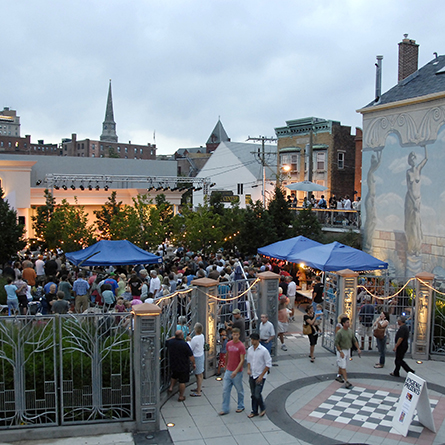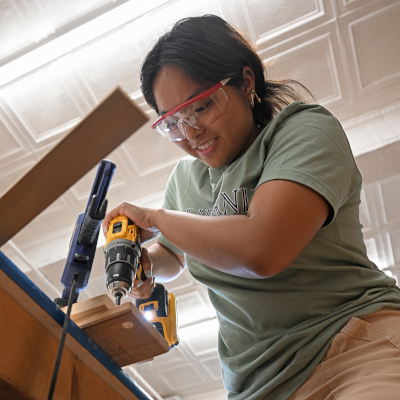
New London and Groton designated an ‘Innovation Place’

Through a community partnership, the cities of New London and Groton have earned the designation of “Innovation Place” by CTNext and will receive up to $900,000 to continue to develop the region as a hub for innovation, entrepreneurialism and business growth.
Driving the initiative is the Thames River Innovation Place, an alliance of public, private and nonprofit organizations in New London and Groton, including Connecticut College. The team is co-led by Hannah Gant, founder of Spark Makerspace in New London, and Susan Froshauer ’74, president and CEO of CURE Innovation Commons in Groton.
“The Thames River partnership in New London and Groton comprises a dynamic leadership team with big idea thinking capable of getting things done,” said Glendowlyn Thames, executive director of the entrepreneur-supporting organization CTNext.
“From one side of the river to the other, from maker and co-working spaces to educational assets to its military connections, the Thames River consortium now has the opportunity to use its Innovation Place designation to advance many of the growth initiatives already in place.”
Established by the Connecticut General Assembly, Innovation Places is a CTNext-run program created to help the state’s communities become centers for entrepreneurism and innovation, magnets for talent and launching points for growth-stage companies.
With the grant, the Thames River group plans to launch six projects that leverage existing resources and build on the strengths of the region, including a Naval Undersea Supply Chain Consortium that can capitalize on the area’s growing national undersea business base, a Cultivator Kitchen to serve as an educational and entrepreneurial center for those interested in culinary arts and the restaurant industry, and a Community Concierge to provide employers with assistance in the recruitment, relocation and retention of new employees.
“We developed these projects based on who we are as a community: diverse, interesting, edgy,” said Tracee Reiser, Connecticut College’s associate dean of community learning, associate director of the Holleran Center for Community Action and Public Policy, and director of community partnerships. “We want to build on economic developments, build on infrastructure and build on partnerships.”
Froshauer said the goal is to make New London and Groton—an area with a demonstrated history of innovation and entrepreneurship—a go-to place for people with big ideas. She added that she is thrilled to be collaborating with her alma mater on the initiative.
“It’s been a gift to have meetings in the different environments on campus and observe how the College interfaces with the community and how committed the College is,” she said.
The Thames River partnerships have already resulted in exciting opportunities. CURE is offering internships for Conn students, and last spring Professor Andrea Wollensak and students in her urban design course collaborated with FRESH (Food: Resources, Education, Security, Health) New London and Spark Makerspace to address food insecurity by creating edible landscapes in areas in need of revitalization.
Vice President for Finance and Administration Richard Madonna called the Innovation Places designation a “statement of support” for the collaboration.
“The programming will have a positive impact on the New London community, and it will create additional opportunities for students to engage in entrepreneurial activity,” he said. “It’s planting the seed for many positive things to come. This is just the beginning.”
Put the world together in new ways. Learn more
June 14, 2017
